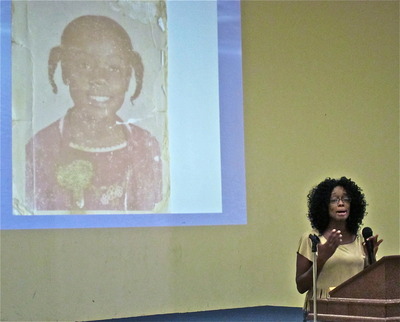Former Addict Brings Message of Hope, Recovery to Durham
 Tonier Cain, 43, of Maryland, stands before a photo of herself as a child, as she speaks Oct. 14 in Durham about the importance of coordinated treatment for trauma, mental illness and substance abuse. Photo by Leanora Minai.For 19 years, Tonier Cain slept under a bridge, ate from trash cans and smoked crack cocaine.
Tonier Cain, 43, of Maryland, stands before a photo of herself as a child, as she speaks Oct. 14 in Durham about the importance of coordinated treatment for trauma, mental illness and substance abuse. Photo by Leanora Minai.For 19 years, Tonier Cain slept under a bridge, ate from trash cans and smoked crack cocaine.
She was arrested 83 times, and convicted 66.
"I was a homeless crack addict," she told police, mental health counselors and others gathered in Durham last week.
Today, Cain, who is from Maryland, tours the country, sharing her story of trauma and recovery.
Her slide presentation is a window into two worlds: Cain in a jail mugshot in Annapolis; Cain standing with former President Bill Clinton in San Diego.
She provided the keynote during the 4th annual Durham Crisis Intervention Team recognition banquet, honoring specially trained police officers and volunteers who’ve gone beyond the call of duty to avert crisis.
In the city and county of Durham, 251 officers and personnel are trained in crisis intervention. From January through September of this year, Durham police officers responded to more than 1,600 calls involving mental health issues.
"Changing lives one person at a time," Sgt. Lori Ray of the Durham Police Department said during opening remarks. "It's not about one individual, one group, one agency. It's about a partnership."
During the banquet in the hall of Veterans of Foreign Wars Post 2740, several awards were presented, and special recognition was given to fire and medic unit personnel who saved the life of a suicidal individual attempting to jump from a bridge.
Some in the audience represented the very professions that Cain says let her down in Maryland.
Until seven years ago.
Cain's story begins at age 9. The oldest, Cain had eight brothers and sisters. Sometimes, her mother left them alone for two, three days at a time in filthy conditions. Her mother entertained men, who, she says, molested her. To numb the pain, she drank alcohol.
At 11, she entered foster care, separated from her siblings.
At 14, she swallowed a bottle of pills.
She survived, but at 19 years old, she found crack cocaine. "It was the answer to all of my problems," said Cain. She was introduced to the criminal justice system and mental health institutions, where counselors gave different diagnoses on different days.
She spent years living on the streets in Annapolis, trading sex for crack.
"Nobody asked me 'why,'" said Cain, now 43.
She told of times when the system let her down. She said her nose was broken during an arrest, and that a drug counselor sexually assaulted her.
But about seven years ago, her life changed when she walked through the door of a treatment program. "I'm so glad you’re here," Cain was told.
A therapist worked with Cain on her trauma: the beatings and rapes she could remember. The lack of love from her mother. The four children Cain gave birth to but gave up. "If I passed them in the streets, I wouldn't even know them," she said. "How do you heal from that?"
With treatment, she said, her belief system changed, her thought process changed, then her decisions changed.
Today, Cain has a daughter in private school. She owns a home. She’s a CEO. She’s an advocate and subject of the documentary, "Healing Neen."
"What a difference it makes when we start to ask, ‘what happened to you’ instead of ‘what’s wrong with you?’" she said.
Treat the trauma, she told the audience.
"Where there’s breath, there's hope …" Cain said. "I am your evidence."